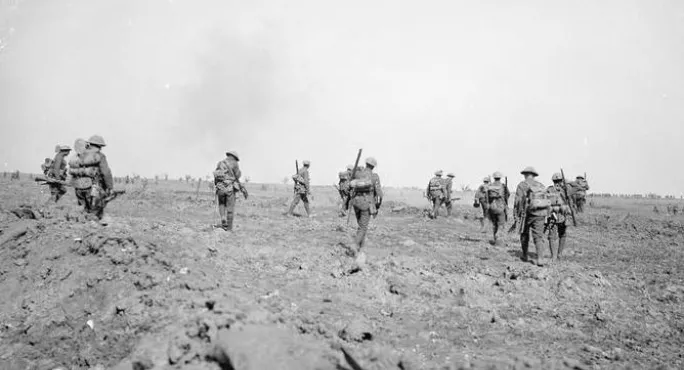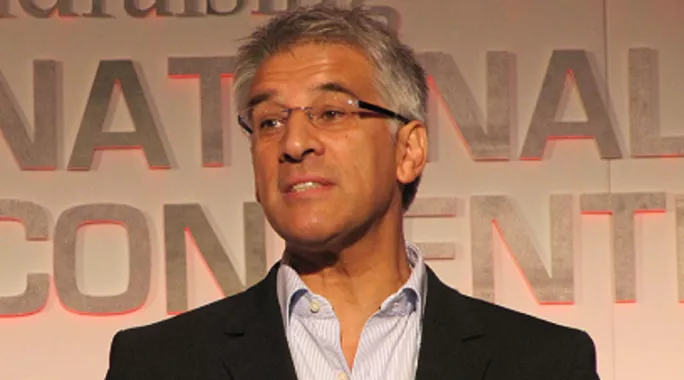- Home
- ‘Why remember the First World War if we don’t learn from it?’
‘Why remember the First World War if we don’t learn from it?’

“What’s the point of remembering World War One unless we are changed by it?”, asks the Rev Steve Chalke, CEO and founder of the Oasis Charitable Trust.
Every year on Armistice day, 11 November, the world pays tribute to the 16 million lives lost in the First World War. In buying poppies and taking part in a two-minute silence, millions in commemorate and celebrate the peace brought about in 1918.
This year marks 100 years since the guns fell silent, and, sadly, says Chalke (pictured below), society today isn’t as peaceful as you’d hope.
“Millions of people lost their loved ones, their families, their homes. It was an absolutely awful atrocity, and you don’t need to be a great studier of world politics to realise that we could easily be back at that place,” says Chalke.
It’s true to say that even in just the past five years, we’ve seen huge disruption worldwide. Donald Trump’s presidency sent waves of anger and dispute across the US and the rest of the world; Paris, London and Brussels have all fallen victim to terror attacks; we've had war in Syria; and, of course, there’s the ongoing conflict between Israel and Palestine. That’s not to mention the Iraq invasion, Afghanistan or any of the other conflicts we’ve endured in the past 100 years.
This is why educating pupils about peace is so important, says Chalke. He’s the man behind a movement that suggests that on Armistice Day, as well as commemorating and remembering the past, we should be looking towards the future and teaching children to be peacemakers in their own societies.
“It’s about global peace, it’s about national peace, it’s about community peace, it’s about family peace, it’s about peace in the classroom," he says.
“It’s giving to kids negotiation skills, it’s teaching kids to climb down when they’re agitated, when they feel aggressive to someone. It’s asking them how they negotiate their own feelings and control their own feelings. How do I take control instead of losing control? Instead of switching and snapping, how do I regain control in this situation?
“It’s no etherial ‘If only I were in charge of the world and Donald Trump wasn’t, it would be a happier place.’ It’s things that I can do today,” he says.
Promoting peace
The chain of Oasis Academies is an arm of Chalke’s charitable trust that has 47 primary and secondary schools throughout the UK. And on 9 November, they will come together to hold events across the country that promote peace.
“We’ve got some big events going on at St Paul’s, Coventry Cathedral, one in Finsbury Park mosque where the terrorist attack took place, there’s a whole raft of these central flagship events," says Chalke.
“It’s hard to tell how many schools are doing it – because a lot of schools pick up an idea from the website and just do it, without telling you – but it is genuinely huge. The Church of England and PiXL [partnership of schools] have both pushed it to their schools, and Songs of Praise have picked up on it and are doing a special episode.”

The events will tackle the agenda around radicalisation, youth violence, bullying, homophobia and racism, and will include a range of dance, drama and poetry performances, sports games, artwork being displayed and special talks from well-known figures.
Oasis provided a template which includes a short video that schools can use, and an anthem that can be sung, but apart from that, it’s up to the schools how they want to organise their own events.
“There are loads of ideas on our website, but everyone can choose what they want to do. We want everyone to own their own event: at St Paul’s they’ll have a traditional Christian service, whereas at Finsbury Park mosque theirs will be Muslim. It’s however they want to interpret it. Some may be more spectacular than others, some may be more traditional,” Chalke explains.
He describes a huge multi-faith event that will bring communities together in Bradford Cathedral, and another on the Isle of Sheppey. At one school’s "Dementia Cafe", students will support elderly people suffering from the condition.
Caring for your community
Paul Murray, community coordinator at Oasis Academy on the Isle of Sheppey, says the whole community has been invited to its peacemaking event on 9 November.
“We’ve got the British Legion coming, we’ve written to all of the [care] homes, and all other schools in the area."
The event will start in the school theatre, with pupils singing, dancing and reading poetry, and it will include the traditional two-minute silence. After that the pupils will take the dementia sufferers through to the cafe – “My wife will be baking cakes, she makes wonderful ones," says Murray – where they will enjoy refreshments.
Just outside the cafe, pupils will take part in a football match with an Armistice touch.
“We will be re-enacting the football match that took place in the Christmas Truce in 1914. We know a shop in Canterbury that does uniforms; they will have German and England uniforms for us, so the students can play an England versus Germany football match in the uniforms that they wore on that particular day in 1914," says Murray.
“The option is that the people in the Dementia Cafe can go out and watch the football match, which will start about 15 minutes after they’ve been in the cafe. Some people will go and watch, some people won’t, and that’s not an issue."
Some would argue that there’s a huge gap between the First World War, peace and reconciliation and a Dementia Cafe, but, actually, it’s all about caring for your community, Murray explains. “Particularly here – we’re an island, and it’s about supporting our community, it’s about our children, and respecting their community and loving their community. Because sometimes, we’re not sure how much the children love their community, and we try to instil that here. We want to teach them that it’s about supporting each other in any way you can.”
And these events don’t need to be one-off occurrences, says Chalke.
“We hope that these events are the beginning and not the end. We’re not building up to doing these events and then we stop.
"We’re saying, 'Why doesn’t your school get involved now, and then there are loads of resources to fuel a journey forward around this.' It’s a low-hanging fruit, there are all the resources there. It’s a brilliant opportunity, the whole nation will be talking about it – so grab it."
All of the resources developed by Oasis can be found here.
Register with Tes and you can read two free articles every month plus you'll have access to our range of award-winning newsletters.
Keep reading with our special offer!
You’ve reached your limit of free articles this month.
- Unlimited access to all Tes magazine content
- Save your favourite articles and gift them to your colleagues
- Exclusive subscriber-only stories
- Over 200,000 archived articles
- Unlimited access to all Tes magazine content
- Save your favourite articles and gift them to your colleagues
- Exclusive subscriber-only stories
- Over 200,000 archived articles



